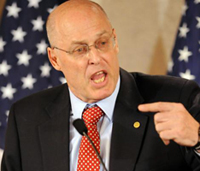 Let’s recap on Americas recent conversations with Henry Paulson regarding the $700+ billion dollars we’ve given him.
Let’s recap on Americas recent conversations with Henry Paulson regarding the $700+ billion dollars we’ve given him.
(Transcript started September 22, 2008…)
America: Good morning Henry.
Paulson: The sky is falling. Give me $700 billion dollars immediately or we won’t have an economy tomorrow.
America: Wait, what?
Paulson: Yes, the end is near and unless you give me this money no questions asked it’s over for all of us.
America: This sounds serious. What are you going to do with the money?
Paulson: Buy toxic debts from the banks to help stabilize the banks and keep people in their homes.
America: So you’re doing this for us, not your friends on Wall Street and bankers in Charlotte right? You want to help all Americans?
Paulson: Yes. No more questions. Write the check.
America: Alright Henry. Do right with our money.
(Jump to 11/13/08…)
Paulson: You remember those toxic assets I was going to buy to help you and the banks?
America: Yes.
Paulson: Forget it. I’m giving it all to the banks.
America: What? Why?
Paulson: Because the situation has changed.
America: In what way?
Paulson: Quit asking questions. The situation changed and I’m adapting. That’s it. And I’m not apologizing.
America: By changed you mean the toxic mortgages were bundled into securities too complex to sort out for government acquisition, as you were warned?
Paulson: No. The situations changed. What did I tell you about the questions?
America: So exactly what are you going to do with our money?
Paulson: Ah, another question. I see you’re paying attention. Like I said, I’m giving it to the banks.
America: Sorry but this is $700 billion we’re talking about. We’re asking questions. Why are you giving it to the banks?
Paulson: So they’ll start lending again.
America: But few of us have any money. We Americans can’t afford to pay the debts we have. Why would we want to borrow more money?
Paulson: Because it creates jobs.
America: So consumers borrowing money they can’t afford to repay creates jobs?
Paulson: Yes. You and you’re incessant questions…
America: Well maybe bank jobs and collections jobs but what about other struggling industries? Like auto?
Paulson: No. Nothing for them. They were mismanaged and need to regroup on their own or fail.
America: By mismanaged you mean like the bank officers who loaned money to people who couldn’t pay it back? Or companies who over sold credit default swaps and could not meet obligations on even the lowest spreads?
Paulson: No. Nothing like that. Enough with your questions. The Federal government is buying shares in these banks and that’s the end of it. We don’t have to answer to you. Haven’t I explained that?
America: Well, isn’t this like starting socialism?
Paulson: No, it’s supporting the free market. Now go away, you’re starting to annoy me.
America: The land of the free, owned by the banks and their political cronies who are ruining the world in the name of wealthy shareholders everywhere.

